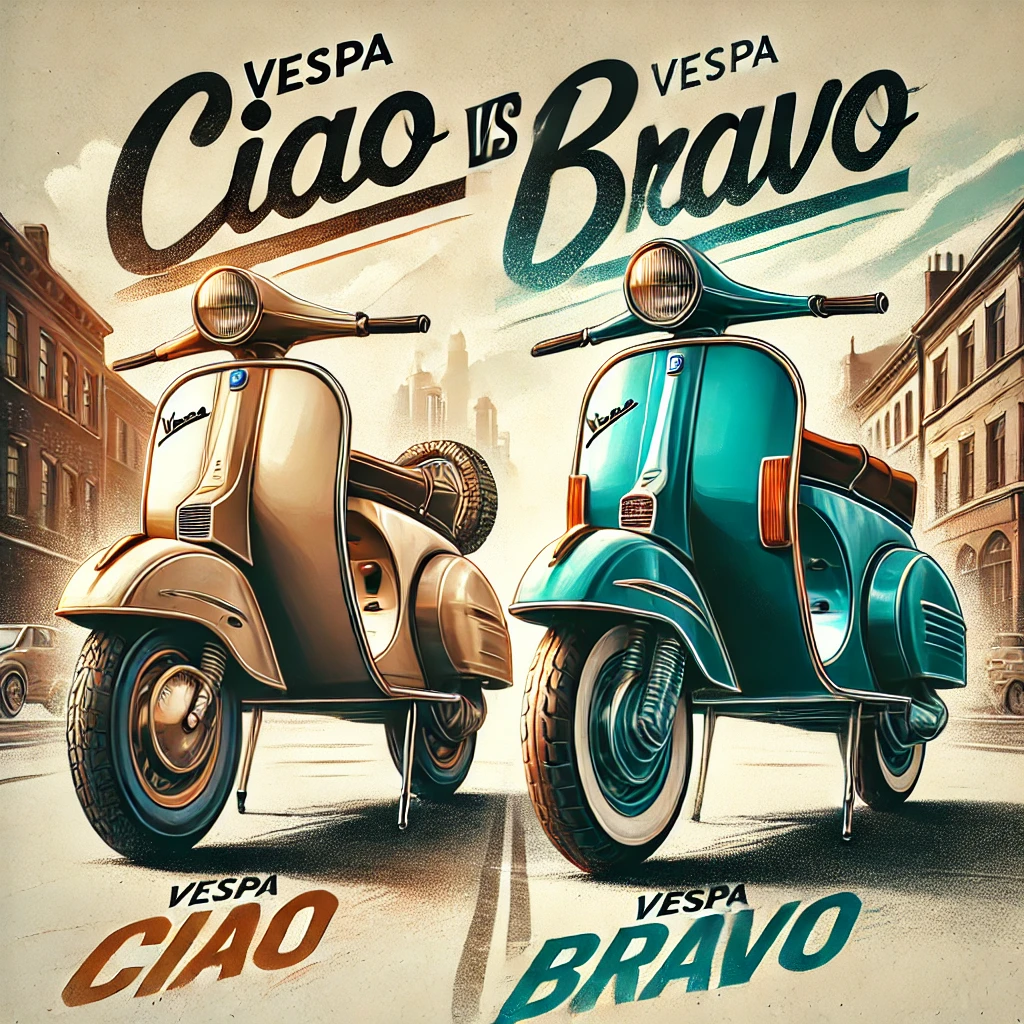The comparison between Vespa Ciao vs Bravo has been a subject of interest for vintage scooter enthusiasts for decades. Whether you’re drawn to the minimalist charm of the Vespa Ciao or the sporty enhancements of the Vespa Bravo, both scooters have earned their place in the world of iconic Italian design. This article delves into their histories, designs, performances, maintenance needs, and more, to help you decide which scooter is the right fit for you.
History and Legacy of Vespa Ciao and Bravo
The Story Behind Vespa Ciao
The Vespa Ciao, introduced in the late 1960s, emerged as a symbol of youth culture and Italian craftsmanship. It was designed for urban commuters, offering a lightweight frame, minimalistic design, and affordable price. The Ciao quickly became a favorite for students and young professionals, thanks to its simplicity and reliability. Even today, Vespa Ciao continues to resonate with vintage scooter fans, delivering an effortless and fun riding experience through city streets.
The Emergence of Vespa Bravo
A decade later, the Vespa Bravo entered the scene as a more robust alternative to the Ciao. Launched in the late 1970s, the Bravo boasted a sturdier frame, improved suspension, and a sportier aesthetic. It was designed for riders who wanted more power and comfort, especially for longer journeys. Though the Bravo maintained the Vespa brand’s iconic design, it added performance features that appealed to those seeking more than just a simple city scooter.
Design and Features Comparison
Vespa Ciao’s Iconic Simplicity
The Vespa Ciao is celebrated for its sleek, minimalist design. Its lightweight frame and compact size make it an ideal choice for navigating crowded city streets. The Ciao offers easy maneuverability, making it particularly appealing to new riders. With vibrant color options and a design focused on efficiency, the Ciao remains a stylish choice without being overly flashy.
Vespa Bravo’s Sportier Edge
In contrast, the Vespa Bravo presents a more muscular design with a sturdier frame and larger front fairing. Its improved suspension ensures a smoother ride, especially on uneven surfaces. The Bravo also includes enhanced features like a larger seat and better lighting, making it suitable for longer rides. For those who appreciate a blend of style and performance, the Bravo offers a bold yet refined approach.
Performance and Handling
Speed and Engine Specifications
When comparing Vespa Ciao vs Bravo, their engines reveal the most significant performance differences. The Vespa Ciao features a 50cc two-stroke engine, perfect for short city commutes. It’s lightweight, fuel-efficient, and easy to handle, making it a great option for navigating urban traffic.
On the other hand, the Vespa Bravo is powered by the same 50cc engine but delivers enhanced power and better acceleration. With a higher top speed, the Bravo is more suited for longer rides or open roads, offering a more versatile riding experience for those looking for a bit more excitement.
| Specification | Vespa Ciao | Vespa Bravo |
| Engine | 50cc, 2-stroke | 50cc, 2-stroke |
| Top Speed | 25-30 mph | 35-40 mph |
| Fuel Efficiency | High | Moderate |
| Suspension | Basic | Enhanced |
| Weight | 38 kg | 48 kg |
Fuel Efficiency and Environmental Impact
Both the vespa ciao vs bravo are fuel-efficient, making them ideal for eco-conscious riders. The Ciao, with its lighter frame and simpler engine, boasts better mileage, often exceeding 100 miles per gallon. This makes it one of the most economical scooters available, particularly for city commutes.
The Bravo, while still fuel-efficient, consumes slightly more fuel due to its added weight and performance features. Nevertheless, both scooters contribute significantly less pollution than traditional vehicles, supporting eco-friendly urban commuting.
Maintenance and Repair Costs
Vespa Ciao: Easy and Affordable Maintenance
One of the reasons the Vespa Ciao remains popular is its ease of maintenance. Its simple design, combined with the widespread availability of spare parts, makes repairs affordable and straightforward. Regular tasks like oil changes, tire checks, and brake adjustments are easy enough for many riders to handle themselves, keeping costs low.
Vespa Bravo: Slightly More Involved Maintenance
While the Vespa Bravo is also known for its reliability, its additional features, like the improved suspension and brakes, require more attention. Although maintenance remains relatively affordable, the Bravo might involve slightly higher costs for parts and labor due to its more complex build. However, with regular upkeep, it remains a durable and dependable scooter.
Resale Value and Collectibility
Vespa Ciao: Vintage Appeal
The Vespa Ciao holds its value well, particularly in the vintage scooter market. Collectors often seek well-maintained Ciaos, and the prices for these models can appreciate over time due to their iconic design and cultural significance.
Vespa Bravo: Growing in Popularity
Though the Vespa Bravo doesn’t yet command the same vintage status as the Ciao, its sportier design and enhanced features make it a desirable option for collectors looking for something different. In good condition, the Bravo can also fetch high resale values, especially among enthusiasts who appreciate performance-focused vintage scooters.
Customization and Modifications
Both the vespa ciao vs bravo offer ample opportunities for customization. Riders can easily upgrade the seat, add a luggage rack, or even modify the engine for better performance. The Bravo’s sturdier frame allows for more extensive modifications, making it a favorite among enthusiasts who enjoy personalizing their scooters.
Comfort for Long Rides
While both scooters are excellent for city commuting, the Vespa Bravo excels in comfort for longer rides. Its enhanced suspension and larger seat provide a smoother and more comfortable experience, making it a better choice for those who enjoy taking longer trips. The Vespa Ciao, with its smaller build, is better suited for shorter, quick commutes within the city.
Final Verdict: Which Scooter Suits You Best?
In the debate of Vespa Ciao vs Bravo, the decision ultimately depends on your personal preferences and riding needs. If you value simplicity, ease of maintenance, and maneuverability in busy city environments, the Vespa Ciao is an excellent choice. Its lightweight design, minimalist charm, and fuel efficiency make it ideal for short trips and urban commuting.
However, if you’re looking for a scooter that offers more performance, comfort for longer rides, and the ability to handle various terrains, the Vespa Bravo is the better option. Its sportier design and enhanced features make it a versatile choice for both urban and suburban riding.
FAQs about Vespa Ciao vs Bravo
What is the difference between Vespa Ciao and Bravo in terms of speed?
The Vespa Bravo offers a higher top speed (35-40 mph) compared to the Vespa Ciao’s 25-30 mph, making it better suited for longer rides.
Which scooter is more fuel-efficient?
The Vespa Ciao is more fuel-efficient due to its lighter frame and simpler engine, making it an excellent option for budget-conscious riders.
Is the Vespa Bravo more comfortable for longer rides?
Yes, the Vespa Bravo has enhanced suspension and a larger seat, making it more comfortable for longer journeys compared to the Ciao.
Are both models easy to maintain?
Both scooters are easy to maintain, but the Vespa Ciao’s simplicity makes it slightly easier and more affordable to service compared to the Bravo.
Which model holds better resale value?
The Vespa Ciao often holds a higher resale value due to its vintage appeal, but the Vespa Bravo’s sporty features make it a popular option for collectors as well.


